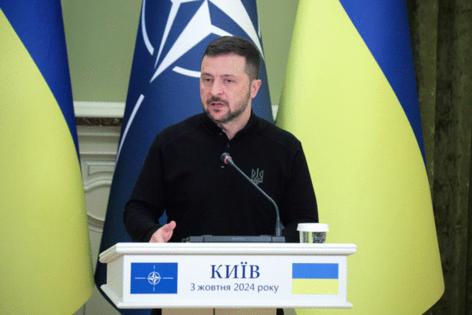Ukraine's allies are leaning on Zelenskyy for a way to end the war
Published in News & Features
After almost 1,000 days resisting the Russian invasion, Ukraine’s allies are pushing Volodymyr Zelenskyy to consider new ways to lure Vladimir Putin to the negotiating table as they seek an end to the fighting.
Donald Trump will return to the White House in January pledging a quick end to the war. German Chancellor Olaf Scholz urged Putin to engage in peace talks during a phone call on Friday. France’s Emmanuel Macron said Sunday that he’ll speak to the Russian leader when the time is right.
Two European officials said there is an increasingly recognition that Zelenskyy will have to compromise with Putin because it has become clear that neither side can secure a decisive victory.
Turkish President Recep Tayyip Erdogan is the latest NATO member to get in on the discussion. He’s set to present his proposal to freeze the conflict on current lines when Group of 20 leaders meet in Rio de Janeiro Monday, according to people familiar with his plans.
The sudden clamor for a settlement shows the renewed urgency from Ukraine’s allies who are trying to get ahead of Trump’s return and the possibility of drastic cuts in U.S. support. With North Korean troops entering the fray on the Russian side, there is growing appetite to halt a conflict which has brought destruction to vast tracts of Ukraine, consumed hundreds of billions of dollars in financial aid and foreign weapons and upended geopolitical relationships in Europe and around the world.
Putin, though, has shown little inclination to consider a truce, despite massive Russian military casualties. The Russian leader told Scholz last week that he has always been open to talks but that any agreement would have to take into account Russia’s security concerns and its territorial gains. The Kremlin is likely to interpret the growing pressure on Zelenskyy as evidence that its attritional strategy is paying off.
On the eve of the G-20, which will be President Joe Biden’s last in office, the U.S. was getting ready to authorize long-range missile strikes on Russian territory. The idea behind that shift is that it will help bolster Zelenskyy’s position before Trump takes office so that he can approach eventual negotiations with a strengthened hand.
China and Brazil, who will also be at the summit in Rio, have been calling for an international conference involving both sides since May.
Zelenskyy told his country’s public broadcaster on Saturday that he wants to end the war next year. He has been pleading with his allies to send him more powerful weapons so that Ukraine can counter Russian attacks more effectively and raise pressure on Putin to seek negotiations.
“For us, victory means a strong Ukraine,” Zelenskyy said. “Whether that’s in diplomacy or on the battlefield is another question.”
Zelenskyy, though, won’t be at the G-20 — Brazilian President Luiz Inacio Lula da Silva ignored his increasingly desperate appeals for an invitation. Putin opted not to attend, saying last month that his presence would “disrupt” the summit because of an arrest warrant against him for alleged war crimes issued by the International Criminal Court.
Zelenskyy’s own formula for peace is based on obtaining a clear path to NATO membership and security guarantees for protection until it joins.
Erdogan will propose, by contrast, that Zelenskyy agrees to delay discussions on joining the alliance for at least 10 years as a concession to Putin, according to people briefed on his thinking, asking not to be named talking about private conversations.
The Turkish proposal envisages the creation of a demilitarized zone in the eastern Donbas region of Ukraine where Russia has controlled large swathes of territory since 2014. Erdogan will suggest that international troops could be deployed there as an additional guarantee and that Ukraine would be assured of military supplies to compensate for agreeing to be left out of NATO.
Turkish officials recognize that such a proposal will be difficult for Ukraine to accept, but they believe it’s the most realistic approach. They would aim to park discussions about the long-term fate of occupied territories to focus on securing a stable ceasefire first.
The overall formula might appeal to some of Kyiv’s allies who are queasy that full NATO membership for Ukraine would risk bringing them into direct conflict with the Kremlin.
Western thinking has shifted since North Korean troops appeared on the battlefield to support Putin’s forces and that shaped Biden’s views on potentially allowing missile strikes on Russia. Assessments by some G-20 nations suggest North Korea could eventually send Russia as many as 100,000 troops.
Erdogan hopes he may be able to convince Zelenskyy to attend peace talks in Istanbul because he’s seen intelligence suggesting that Ukraine could lose a lot more territory in the next few months unless the fighting is halted, according to the people briefed on his thinking. But the outlook on the battlefield also offers Putin an incentive to keep fighting.
“No matter what Putin says, he doesn’t want peace and is not ready to negotiate it,” Macron told reporters on the tarmac in Buenos Aires as he prepared to depart for Rio. “Putin’s intention is to intensify the combat, we’ve seen this for weeks.”
_____
(With assistance from Alberto Nardelli, Samy Adghirni and Julien Ponthus.)
©2024 Bloomberg L.P. Visit bloomberg.com. Distributed by Tribune Content Agency, LLC.







Comments